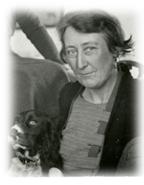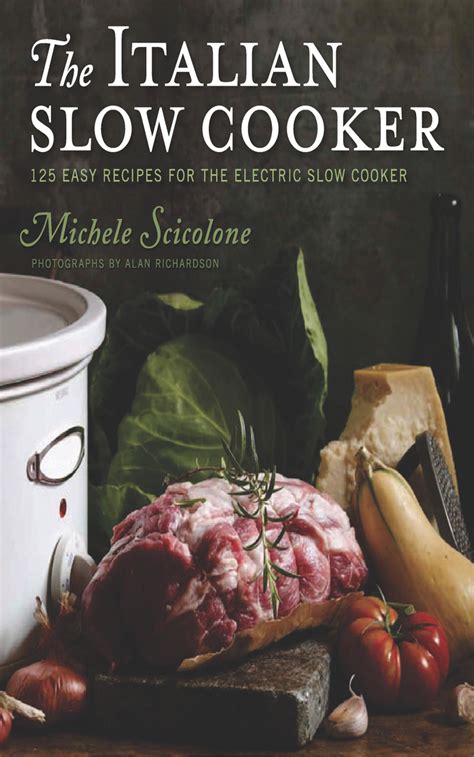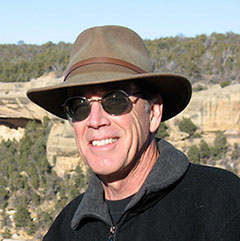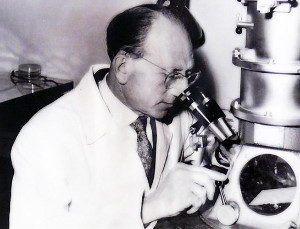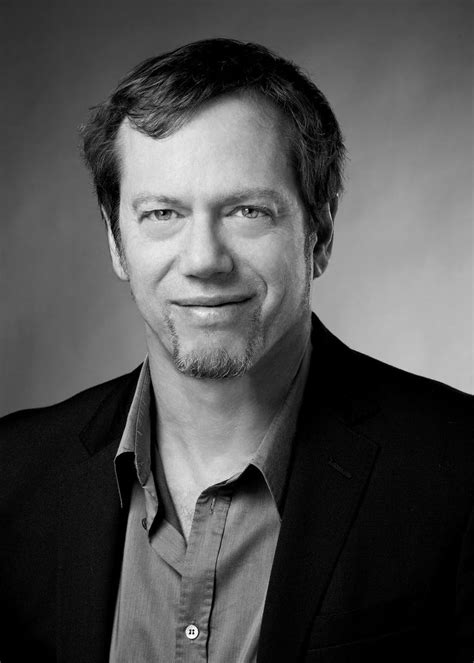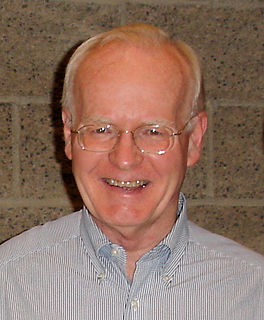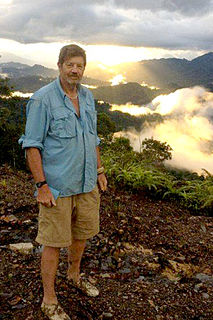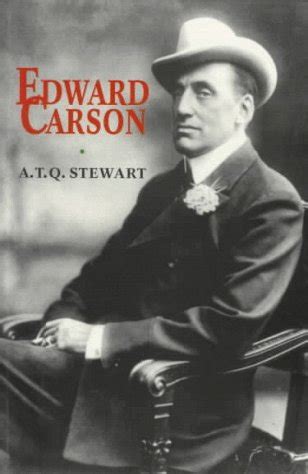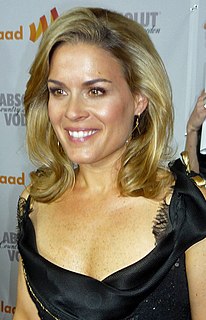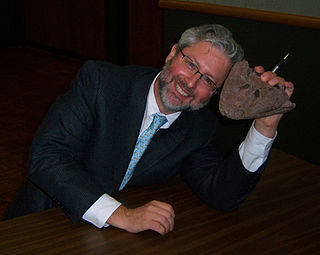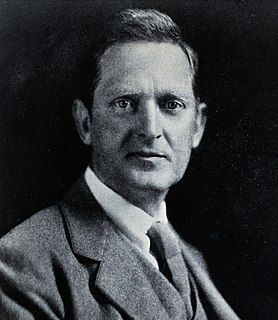Top 164 Bacteria Quotes & Sayings - Page 3
Explore popular Bacteria quotes.
Last updated on November 8, 2024.
Biological energy comes from the sun. Light energy harvested by photosynthesis in chloroplasts and phototropic bacteria becomes stored in carbohydrates and fats. This stored energy can be released by oxidative metabolism in the form of adenosine triphosphate (ATP) and used as fuel for other biological processes.
Perhaps bacteria may tentatively be regarded as biochemical experiments; owing to their relatively small size and rapid growth, variations must arise much more frequently than in more differentiated forms of life, and they can in addition afford to occupy more precarious positions in natural economy than larger organisms with more exacting requirements.
The 4th sort of creatures... which moved through the 3 former sorts, were incredibly small, and so small in my eye that I judged, that if 100 of them lay [stretched out] one by another, they would not equal the length of a grain of course Sand; and according to this estimate, ten hundred thousand of them could not equal the dimensions of a grain of such course Sand. There was discover'd by me a fifth sort, which had near the thickness of the former, but they were almost twice as long.
The first time bacteria were observed.
I've been collecting articles on extremophile bacteria for at least the last ten years. I find them fascinating, whether they live in boiling pools at Yellowstone, around thermal vents at the floors of the oceans, or on Mars, where NASA has been searching for them as the first evidence of life beyond Earth.
We add that it would be all too easy to object that mutations have no evolutionary effect because they are eliminated by natural selection. Lethal mutations (the worst kind) are effectively eliminated, but others persist as alleles. ...Mutants are present within every population, from bacteria to man. There can be no doubt about it. But for the evolutionist, the essential lies elsewhere: in the fact that mutations do not coincide with evolution.
Nature is flexible and resilient. Nature likes redundancy and dispersion. It is approximate and deals in gradients. All boundaries are permeable. Nature nests small systems like molecules within larger systems like cells, which in turn are nested in systems called organs, organisms, ecosystems. We grew from ancient one-celled ancestors. Nature likes mergers: we contain multitudes of other life forms within us. We stand at the crest of four billion years, bacteria molded into wondrous form, burning with a slow fire and about to take the next step.
Very close cousins like humans and chimps have almost all their genes in common. Slightly less close cousins like humans and monkeys still have recognizably the same genes. You could carry on right on down to humans and bacteria, and you will find continuous compelling evidence for the hierarchical tree of cousinship.
We travel because, no matter how comfortable we are at home, there's a part of us that wants - that needs - to see new vistas, take new tours, obtain new entrees, introduce new bacteria into our intestinal tracts, learn new words for "transfusion," and have all the other travel adventures that make us want to French-kiss our doormats when we finally get home.
Twentieth-century developments in science support a new animism. Developments in physics have led to a world of energetic events which seem to be self-moving and to behave in unpredictable ways. And recent studies in biology seem to demonstrate that bacteria and macromolecules have elemental forms of perception, memory, choice, and self-motion.
I would have bacteria and, yeah, it would grow in what we call the danger zone, which is typically between 40 and 140. But if I'm getting something out of my refrigerator where it's been basically pretty clean and I'm putting it on my counter, what exactly is going to happen in that amount of time that going into a hot oven isn't going to kill? Nothing.
We all have weak moments, moments where we lose faith, but it's our flaws, our weaknesses that make us human. Science now performs miracles like the gods of old, creating life from blood cells or bacteria, or a spark of metal. But they're perfect creatures and in that way they couldn't be less human. There are things machines will never do, they cannot possess faith, they cannot commune with God. They cannot appreciate beauty, they cannot create art. If they ever learn these things, they won't have to destroy us, they'll be us.
No one can practice the precepts perfectly, including the Buddha... Boiled vegetables contain dead bacteria. We cannot practice the First Precept or any of the precepts perfectly. But because of the real danger in our society-alcoholism has destroyed so many families and has brought about much unhappiness-we have to do something. We have to live in a way that will eradicate that kind of damage. That is why even if you can be very healthy with one glass of wine every week, I still urge you with all my strength to abandon that glass of wine.
Most educated people are aware that we are the outcome of nearly 4 billion years of Darwinian selection, but many tend to think that humans are somehow the culmination. Our sun, however, is less than halfway through its lifespan. It will not be humans who watch the sun’s demise, 6 billion years from now. Any creatures that then exist will be as different from us as we are from bacteria or amoebae.
[In research on bacteria metabolism] we have indeed much the same position as an observer trying to gain an idea of the life of a household by careful scrutiny of the persons and material arriving or leaving the house; we keep accurate records of the foods and commodities left at the door and patiently examine the contents of the dust-bin and endeavour to deduce from such data the events occurring within the closed doors.
We are beginning to shift into life code. And in the process of shifting into life code, every life form on this planet is coded in a double helix with a sugar phosphate backbone. And that codes whether you become a bacteria, an orange, a lemon, a Lemur, a Cow, a sheep, a human being, a politician, any one of these things is all coded in this four-letter code.
Since the universe must contain millions of appropriate planets, consciousness in some form - but not with the paired eyes and limbs, and the brain built of neurons in the only example we know - may evolve frequently. But if only one origin of life in a million ever leads to consciousness, then Martian bacteria most emphatically do not imply Little Green Men.
My mitochondria comprise a very large proportion of me. I cannot do the calculation, but I suppose there is almost as much of them in sheer dry bulk as there is the rest of me. Looked at in this way, I could be taken for a very large, motile colony of respiring bacteria, operating a complex system of nuclei, microtubules, and neurons for the pleasure and sustenance of their families, and running, at the moment, a typewriter.
The usual way of growing cotton is highly petrochemical-intensive, requiring 110 pounds of nitrogen fertilizer per acre. Some of the fertilizer is broken down by soil bacteria into nitrate, a toxic and highly soluble chemical that can leach into groundwater or get washed into lakes, creating oxygenless dead zones.
Take pandemics. There could easily be a severe pandemic. A lot of that comes from something we don't pay much attention to: Eating meat. The meat production industry, the industrial production of meat, uses an immense amount of antibiotics.We're now running out of antibiotics that deal with the threat of rapidly mutating bacteria. A lot of that just comes from the meat production industry. Well, do we worry about it? Well, we ought to be.
Ours is certainly not an old culture. Yet in recent decades we've used more energy, destroyed more soil, created more pathogenicity (temporarily stopped some too, for sure), mutated more bacteria, and dumped more toxicity on the planet than all the cultures before us-combined. I love the United States, but I am not blind to the wrongs. I have no desire to live anywhere else, but that doesn't mean I think everything we're doing should be done or can be maintained.
If the age of the Earth were a calendar year and today were a breath before midnight on New Year's Eve, we showed up a scant fifteen minutes ago, and all of recorded history has blinked by in the last sixty seconds. Luckily for us, our planet-mates--the fantastic meshwork of plants, animals, and microbes--have been patiently perfecting their wares since March, an incredible 3.8 billion years since the first bacteria. ...After 3.8 billion years of research and development, failures are fossils, and what surrounds us is the secret to survival.
Proper turkey preparation is critical. According to the U.S. Department of Agriculture, more Americans die every year from eating improperly cooked turkey than were killed in the entire Peloponnesian War. This is because turkey can contain salmonella, which are tiny bacteria that, if they get in your bloodstream, develop into full-grown salmon, which could come leaping out of your mouth during an important business presentation.
The phrase 'contrary to all expectations' rings through the story of the progress of human knowledge. It was 'contrary to all expectations' that the Earth was found to revolve around the sun, and not the other way round, and that a mould growing in one of Dr. Alexander Fleming's dishes was found to be capable of destroying bacteria. When in 1989 the spacecraft Voyager 2 got close enough to the planet Naptune to take detailed pictures of the surface, they were 'contrary to all expectations'.
Without birds to feed on them, the insects would multiply catastrophically. The insects, not man or other proud species, are really the only ones fitted for survival in the nuclear age. The cockroach, a venerable and hardy species, will take over the habitats of the foolish humans, and compete only with other insects or bacteria.
Take the entire 4.5-billion-year history of the earth and scale it down to a single year, with January 1 being the origin of the earth and midnight on December 31 being the present. Until June, the only organisms were single-celled microbes, such as algae, bacteria, and amoebae. The first animal with a head did not appear until October. The first human appears on December 31. We, like all the animals and plants that have ever lived, are recent crashers at the party of life on earth.
Around New York City, samples collected at dozens of beaches or piers have detected the types of bacteria and other pollutants tied to sewage overflows. Though the city's drinking water comes from upstate reservoirs, environmentalists say untreated excrement and other waste in the city's waterways pose serious health risks.
I think that we reject the evidence that our world is changing because we are still, as that wonderfully wise biologist E. O. Wilson reminded us, tribal carnivores. We are programmed by our inheritance to see other living things as mainly something to eat, and we care more about our national tribe than anything else. We will even give our lives for it and are quite ready to kill other humans in the cruellest of ways for the good of our tribe. We still find alien the concept that we and the rest of life, from bacteria to whales, are parts of the much larger and diverse entity, the living Earth.
You are one miniscule piece of a never-ending cycle. In fact, you're not even a piece. You're just a holder for billions and billions of other pieces. Whether that's organic components, living organisms inside your body, bacteria or whatever it is, you're just part of the soup of the universe, so just try to enjoy what's good about it.
It's also hard for people to contend with the difficult possibility that we are simply overadvanced fungi and bacteria hurtling through a galaxy in cold, meaningless space. But just because our existence may have arisen unintentionally and without purpose doesn't preclude meaning or purpose from emerging as a result of our interaction and collaboration. Meaning may not be a precondition for humanity as much as a by-product of it.
Industrial agriculture now accounts for over half of America's water pollution. Two years ago, Pfiesteria outbreaks connected with wastes from industrial chicken factories forced the closure of two major tributaries of the Chesapeake and threatened Maryland's vital shellfish industry. Tyson Foods has polluted half of all streams in northwestern Arkansas with so much fecal bacteria that swimming is prohibited. Drugs and hormones needed to keep confined animals alive and growing are mainly excreted with the wastes and saturate local waterways.
What we want is another sample of life, which is not on our tree of life at all. All life that we've studied so far on Earth belongs to the same tree. We share genes with mushrooms and oak trees and fish and bacteria that live in volcanic vents and so on that it's all the same life descended from a common origin. What we want is a second tree of life. We want alien life, alien not necessarily in the sense of having come from space, but alien in the sense of belonging to a different tree altogether. That is what we're looking for, "life 2.0."
In the beginning, there were bacteria.... [A] nearly universal assumption is that all subsequent life descended from the original life form through a continuous chain of ancestor-descendant pairs. This assumption looks good because all living organisms share biochemical traits. It is conceivable, of course, that life originated more than once on the early earth but that all except one life form died out early, leaving a single lineage as the ancestor of life as we know it. If this did happen, it was the first important species extinction.
[I]nfectious disease is merely a disagreeable instance of a widely prevalent tendency of all living creatures to save themselves the bother of building, by their own efforts, the things they require. Whenever they find it possible to take advantage of the constructive labors of others, this is the path of least resistance. The plant does the work with its roots and its green leaves. The cow eats the plant. Man eats both of them; and bacteria (or investment bankers) eat the man.
Has it ever occurred to you how lucky you are to be alive? More than 99 percent of all the creatures that have ever lived have died without progeny, but not a single one of your ancestors falls into that group! ... Not a single one of your ancestors, all the way back to the bacteria, succumbed to predation before reproducing, or lost out in the competition for a mate.
Every November, during the certain holiday people love so much, people take a dead turkey, open up the dead turkey’s ass, or carve out a really big hole in their ass, take some stuffing and shove it inside their dead empty ass, and use the little dead ass as an oven to bake some bread. Somebody else’s dead empty bacteria-laden ass to make bread? Ass bread?! And people think vegans are weird? Because we eat tofu? And rice, and beans, and lentils?

